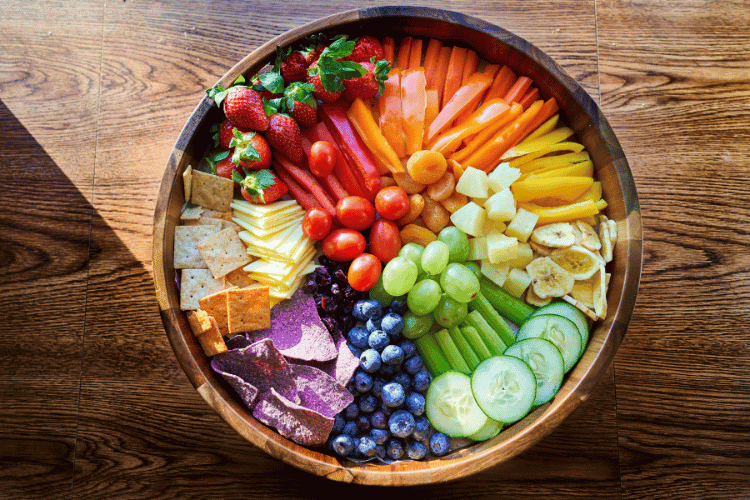Vegan Diet for Beginners: The Only Guide You Need
As more people recognise the numerous benefits of a vegan lifestyle, the popularity of the plant-based diet continues to soar.
Whether you’re drawn to this path for health benefits, ethical concerns, or environmental consciousness, transitioning to a vegan diet can be both exciting and maybe slightly overwhelming at first.
But fear not! This comprehensive guide to a vegan diet for beginners will tell you everything you need to know about your new lifestyle.
Here, we’ll explore different types of vegan diets, offer practical tips, and help you embark on a nourishing and fulfilling vegan lifestyle.
Different Types of Vegan Diets
Here’s what many people don’t tell you: there are plenty of different types of vegan diets. It’s better to study them thoroughly to decide the best option for you. Here’s an overview of each popular type:
Raw Food Vegan Diet
Embracing the philosophy that cooking may ruin vital nutrients, raw food vegans consume only uncooked, unprocessed plant-based foods. Or, they eat foods cooked at low temperatures.
Their diet primarily consists of fruits, vegetables, nuts, seeds, and sprouted grains. They believe that raw food preserves enzymes and micronutrients, enhancing overall health and vitality. However, careful planning is essential to ensure adequate nutrient intake, and some may find it challenging to sustain this diet long-term.
Whole Food Vegan Diet
The whole-food vegan diet centres around unrefined and minimally processed plant-based foods, emphasizing whole grains, legumes, fruits, vegetables, nuts, and seeds.
This approach promotes consuming foods in their most natural state, retaining essential nutrients and fibre. By focusing on whole foods, people can enjoy a balanced and nutritious diet while supporting overall well-being.
High Carb, Low Fat Vegan Diet

This vegan diet is characterized by high consumption of carbohydrates, primarily from whole plant foods like grains, fruits, and starchy vegetables while minimizing fat intake.
Followers claim that this eating style supports weight loss, improves athletic performance, and enhances energy levels. However, it’s crucial to choose healthy carb sources and include adequate protein and fat to meet nutritional needs.
80/10/10 Diet
Also known as the low-fat raw vegan diet, the 80/10/10 diet derives 80% of its calories from carbohydrates, 10% from protein, and 10% from fat.
Followers primarily consume fruits, leafy greens, and non-starchy vegetables. They believe that this ratio is ideal for human physiology and can lead to improved digestion, increased energy, and better overall health. However, it may not be suitable for everyone, and again, careful attention to nutrient intake is vital.
How to Start Your Vegan Diet: 7 Steps
Transitioning to a vegan diet may feel like a daunting task, but with proper planning and guidance, it can be a smooth and rewarding experience. Here are the essential steps to help you embark on your vegan journey:
1. Educate Yourself
Take the time to learn about the principles of a vegan diet, why are you doing it, the benefits it offers, and the potential challenges you might face. Understand which nutrients may require special attention, such as vitamin B12, iron, calcium, and omega-3 fatty acids.
Reliable resources like reputable websites, books, and documentaries can provide valuable insights.
2. Assess Your Current Diet
Before diving into a vegan lifestyle, evaluate your current eating habits. Identify plant-based foods you already enjoy and dishes that can be easily adapted to a vegan version. This self-assessment will give you a head start and boost your confidence in making the switch.
3. Choose Your Approach
Decide on the pace of your transition. Some individuals prefer a gradual approach, phasing out animal products over time, while others opt for a more immediate shift. Determine what works best for you, considering your personality and your busy lifestyle.
4. Stock Your Kitchen
Make a vegan-friendly grocery list and stock up on vegan foods like fruits, vegetables, whole grains, legumes, nuts, seeds, and plant-based milk. Having these ingredients readily available will make meal preparation more convenient.

5. Explore Vegan Recipes
Experiment with new recipes and vegan versions of your favourite dishes. There is a wealth of vegan cookbooks, blogs, and websites with delicious and creative plant-based meal ideas. This exploration can introduce you to a wide variety of flavours and make your vegan diet even more enjoyable.
You may feel lost at first, but once you stock your kitchen with the right ingredients and find the right recipes, you won’t find it hard to quickly cook vegan options.
6. Be Mindful When Dining Out
Eating at restaurants or social gatherings will almost certainly pose challenges for beginners. Check out the menu in advance and look for vegan-friendly options. Most restaurants are accommodating and can modify dishes to suit your dietary preferences.
In my experience, the vegan offerings are usually dire! But I was raised as a meat eater and most pubs and restaurants are only just beginning to cook with vegan meats.
7. Read Labels
Familiarise yourself with reading food labels to identify non-vegan ingredients. Some products may contain hidden animal-derived components, such as gelatine or certain additives. Being label-savvy is essential to ensure you’re making vegan choices.
Or just do what I do and look for the V label (vegan/vegan friendly). A quick note about Vegan Friendly. This still means the product is vegan, However, the word Vegan is a trademarked word owned by the Vegan Society.
Vegan Diet for Beginners: Meal Ideas
Transitioning to a vegan diet opens up a world of delicious and nourishing meal possibilities, though it may seem otherwise. The lack of animal-based foods doesn’t mean you have to do guesswork to make food. There are plenty of ideas that don’t need non-vegan ingredients.
Here are some mouth-watering meal and snack ideas to inspire your culinary journey:
Breakfast
- Overnight oats with almond milk, chia seeds, fresh berries, and a drizzle of maple syrup. This wholesome and satisfying breakfast can be prepared the night before for a hassle-free morning.
- Smoothie bowl packed with spinach, frozen bananas, plant-based protein powder, and toppings like sliced kiwi, granola, and coconut flakes. It’s a vibrant and nutrient-dense way to kickstart your day.
Lunch
- Quinoa and black bean salad with diced cucumbers, cherry tomatoes, avocado, and a zesty lime-cilantro dressing. This protein-packed salad is both filling and refreshing.
- Veggie wrap with hummus, shredded carrots, sliced bell peppers, spinach, and a sprinkle of hemp seeds. Roll it up in a whole-grain tortilla for a quick and portable lunch.
Dinner
- Chickpea curry simmered in coconut milk and tomato-based sauce, served over brown rice. This hearty and aromatic dish will delight your taste buds.
- Roasted vegetable and tofu stir-fry with a savoury soy-ginger sauce. This colourful and flavourful stir-fry is a delightful way to enjoy a variety of veggies.
Snacks

- Fresh fruit platter with a mix of seasonal fruits like watermelon, pineapple, and grapes. A simple yet satisfying snack bursting with natural sweetness.
- Energy balls made from dates, almonds, and cocoa powder. These bite-sized treats are perfect for satisfying sweet cravings.
Desserts
- Vegan chocolate avocado mousse blended with ripe avocados, cocoa powder, and a touch of maple syrup. It’s a creamy and decadent treat without dairy or added sugars.
- Baked apple slices sprinkled with cinnamon and served with a dollop of dairy-free yogurt. A guilt-free dessert option that’s warm and comforting.
Beverages
- Green smoothie featuring kale, banana, pineapple, and a splash of coconut water. It’s a refreshing way to sneak in some leafy greens.
- Golden milk latte made with turmeric, almond milk, and a pinch of black pepper. This soothing drink offers anti-inflammatory benefits and a delightful flavour.
Whether you’re an experienced cook or a novice in the kitchen, experimenting with vegan recipes can be a rewarding and enjoyable experience that supports your journey to a healthier and compassionate lifestyle.
Conclusion
As you venture into this sustainable way of living, remember that it’s a journey filled with learning, growth, and exciting culinary experiences. A vegan diet promotes heart health, brain health, and regulates blood sugar, so it’s worth trying.
Please don’t think if you go off-course, then you can’t still be vegan! If you want to, take it steady. Try 25% vegan, then 30% and so on. Then when you get to 100% and if you have a little slip, don’t beat yourself up about it!
I have a personal technique that definitely keeps me from eating animal products. I won’t go into the details but in the course of researching how to stop animal cruelty and setting up this website, I saw images that still haunt me.
By exploring different types of vegan diets, setting realistic goals, and seeking support, you can transition smoothly to the new lifestyle.
Embrace the abundance of delicious plant-based meal ideas and be kind to yourself through any challenges.
All the ingredients and products that we have mentioned above can be found in our SHOP section.







